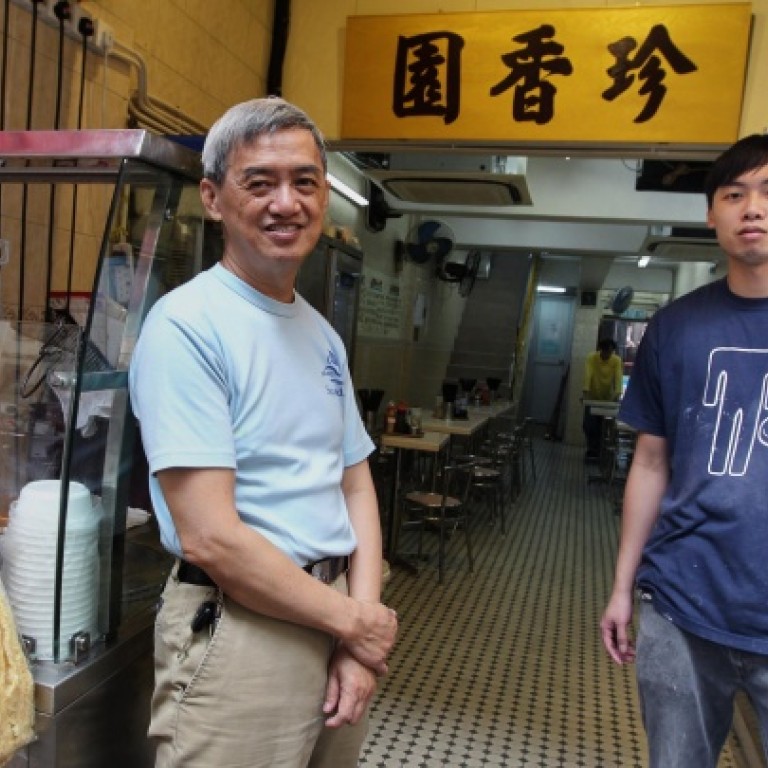
Tofu master intent on preserving skills
While many traditional bean curd shops are closing their doors, one man is staying put and has enlisted his sons to keep the business going
Tofu may still be a popular food in Hongkongers' daily diet, but old-style shops making the bean curd delicacies are on the verge of extinction, despite efforts by the owners to pass on their traditional skills.

One man determined to buck the trend is Bill Chan Tze-fu, 63, who "threatened and cajoled" his two sons into joining his bean curd business, Jan Heung Yuen in Sai Wan Ho.
"I want to pass on the skills of making this low-cost and high-quality food, and make it well-known," he said. "I hope my sons will finish this mission for me."
The two men, aged 26 and 28, returned to Hong Kong after studying in Canada and are now working full-time at the shop, which also has a few tables for people to sit and enjoy a bowl of tofu dessert or a fried meat bun.
Chan, the third generation to run the business, renovated the shop last year to make it more appealing to his sons.
"I threatened them and I cajoled them," he laughed when asked how he persuaded them to join the family firm.
Chan says he has witnessed the closure of 50 to 60 tofu shops since the 1960s.
The few that remain sell food in front and process soybeans at the back. In the past, the owner and staff would live in the attic.
"Inheritance is the biggest problem," Chan said. "It's quite sad. Many are retired and their children won't take up the business. It's hard to recruit people. The work is harsh and people are tired of it. I'm an exception. I have a special love for it."
"Traditional Tofu Making", Video by Hedy Bok
When asked to explain the tofu-making process, Chan shows off a stone mill which he says is the only method he recognises as being able to retain the nutrients in soybeans.
"There are new methods of adding different minerals to tofu," he says. "I'm not sure if they work. I haven't experimented with them."

His grandfather started the business in Guangzhou and his father brought it to Hong Kong in the 1920s.
He started helping in his father's shop when he was seven. He and his nine siblings worked before and after school, having no choice as the family's livelihood depended on it.
He was the only one willing to take up the business when his father died in the early 1990s.
His sons also helped in the shop as children.
"When I was small, I didn't like it here. The work was so harsh," said Jonathan Chan Yik-nam, the younger son. "Then I worked in Canada and understood that [all] working is harsh."
He has been working full-time at the shop for a year now. To him, the biggest challenge is getting up early, arriving at the shop at 6.30am every day and taking only one day off a month. His brother takes the afternoon shift.
"My father is a very capable man. He works such long hours, as if he's made of iron," Jonathan said.
Though the work is tough, he derives satisfaction from customers' praise. "When the housewives praise our tofu, saying that it's smooth, it makes me quite happy. People's appreciation keeps me going," he says
In the 1980s, the family also ran a factory supplying tofu to markets and restaurants. But it could not compete with wholesalers and closed.
The shop kept running as Bill Chan worked on, diversifying the food he sold. He expanded the menu with items like fried turnip cakes - a traditional snack sold outside railway stations in the 1950s.
But when the rent doubled two years ago it was almost the final straw. Luckily the property owner decided to lower the rent and the business survived.
"I almost pulled out of the game. It would have been our neighbourhood's loss," Chan said. "I have nothing more to ask for. I continue only because this is where my passion is. When my sons can handle it, I will retire."
Jonathan said he still had a lot to learn.
"If one day, say, my dad goes travelling, and we can run the shop on our own, then I will be confident enough," he said.
"I will start making plans for it [taking over] then."
